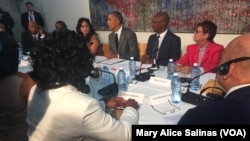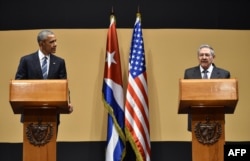In a small, white room of the newly opened United States embassy in Havana, the simple exchange of a document summed up the significance of a meeting between President Barack Obama and 13 Cuban dissidents.
“Do you have a copy of the list?” Elizardo Sánchez Santacruz says the president asked him.
“Sure, I have it here,” Sánchez Santacruz reports he respectfully responded.
“Can you give me one?” the president replied.
“And then I gave it to him,” Sánchez Santacruz told VOA.
The list Obama received from the dissident contained the names of 89 political prisoners.
Sánchez Santacruz, the president of the Cuban Commission for Human Rights and National Reconciliation, gave the list to the U.S. leader when Sánchez Santacruz brought up the moment when Cuban President Raul Castro, almost agitated, responded to the inquiry of an American reporter at a rare press conference Monday about political prisoners on the island. Castro stated there are no political prisoners in Cuba.
"Show me the list," Castro said. "What political prisoners? Give me a name!"
“This is not news. There have always been [political prisoners] and the government of Cuba has always said there are not,” Sánchez Santacruz told VOA minutes after meeting with Obama in the embassy.
Discussion among 'persons'
Dissidents present in the hour-and-fifteen-minute meeting told VOA the discussion with Obama was “frank, relaxed and open.”
“[Obama] made clear that U.S. politics are committed to human rights, fundamental liberties and that the basic steps that are being taken are in the right direction to empower the Cuban people and to create a bigger number of spaces so people can express themselves,” said Manuel Cuesta Morúa, leader of the organization Progressive Spectrum in Cuba.
At least two of the dissidents in the meeting were arrested as recently as Sunday. For years, they said, they have been abused by the Cuban regime. For them, the occasion was validation after years of struggle.
“The message it sends is that the other voices in Cuba, we, the ones that fight for democracy and freedom, are voices that have support and that we are legitimate voices in the political debate,” said Cuesta Morúa.
Sánchez Santacruz added that Obama wanted to deliver “a message of human acknowledgment and moral support.” He said the message was in defiance of the Castro government that “keeps on treating us as if we aren’t persons.”
Opposing rapprochement
While some are very excited with the diplomatic reset, other dissidents think the new policy from the Obama administration will legitimize the communist government. Three out of the 13, according to interviews with dissidents in the meeting, expressed to Obama, face to face, that they are against the new détente.
“He answered that he disagreed. He said that one can’t expect an immediate result,” said Cuesta Morúa. “He used the example of Myanmar, where rapprochement led to the opening of the political system,” he added.
Miriam Leiva, an independent journalist and one of the 13 invitees, said “[Obama] was very respectful. He listened to them and by the end of the meeting he explained his opinion but only to let them know that he was aware of the situation in Cuba.”
“He thinks his policy is going to help the Cuban society and that changes don’t come overnight,” Leiva added.
No positive change
During the meeting, some dissidents also wanted to inform Obama that after his announcement on December, 2014, not much changed positively for Cubans on the island. Goods are harder to find, unemployment has increased and access to the Internet has not been expanded.
“I think many of us said that changes are not as fast as we could expect because the Cuban government is preventing his measures from getting to the people and have more impact,” said Leiva.
And while the dissidents agreed the meeting is historic and gives them validity and support in the face of what they call a “repressive regime,” the censorship won’t stop.
“I don’t think this will make the Cuban government change its posture of intolerance and its tendency to repression and intimidation to the dissident movement and against all society,” sighed Sánchez Santacruz. “Sadly, that won’t change.”













